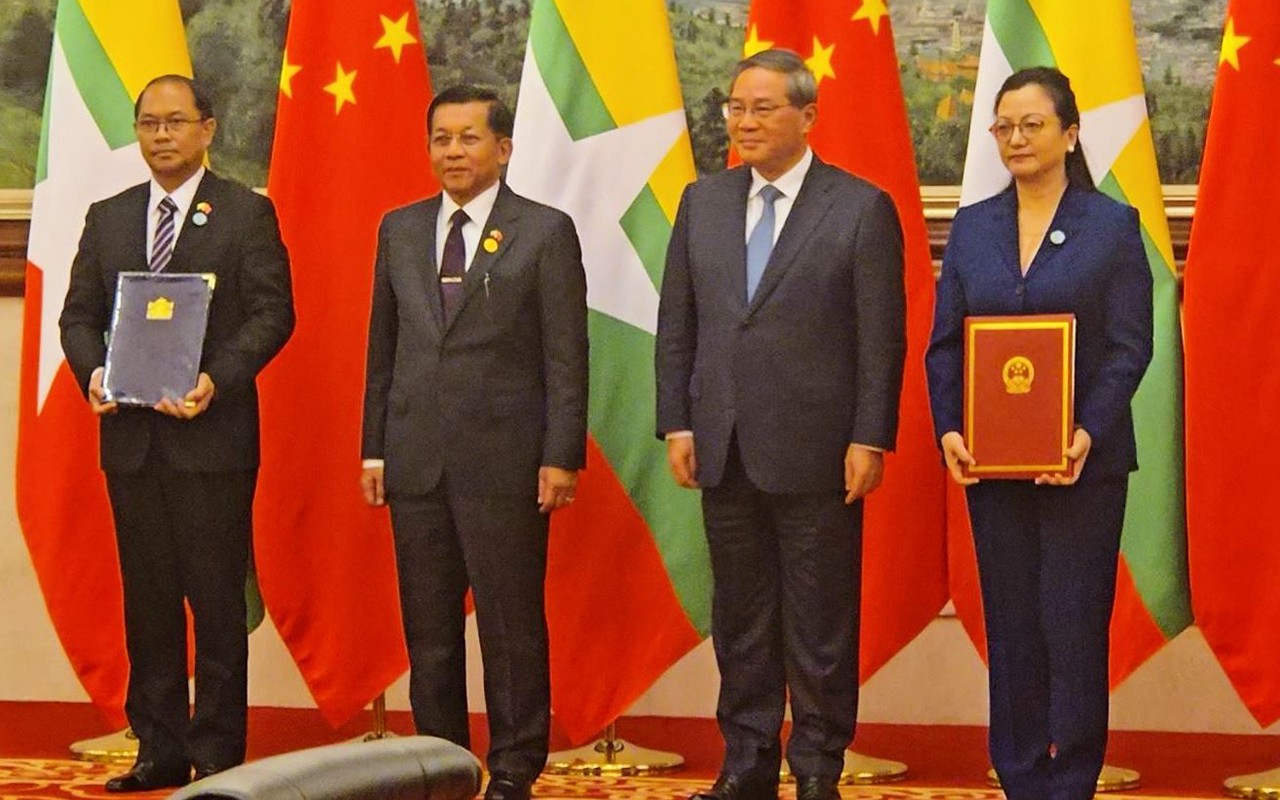2024 : A year of deepened Myanmar-China ties

1599

Tin Zar Lynn (NP News) - Nov 25
China involved as an important neighbour to Myanmar, with their bilateral relations shaped by economic connectivity and a shared 2,185- kilometer border. Since Myanmar has been under the control of the State Administration Council (SAC) government, Western nations have been closely monitoring China's position toward the new government. Initially, China adopted a neutral stance, avoiding a definitive position on the SAC. However, by 2024, China began to openly express its support for the SAC government on the international stage. Its engagement in Myanmar's political affairs has proven to be both effective and advantageous, helping the SAC address internal challenges.
Diplomatic engagement
Diplomatic ties between Myanmar and China experienced a notable improvement in late 2024. Chinese Ambassador to Myanmar, Ms. Ma Jia, has played a key role in strengthening these relations by actively engaging with Myanmar's political landscape. Since assuming her position, she has met with high-level Myanmar officials across various sectors, including defense and investment, and has effectively addressed key matters. Her involvement goes beyond traditional diplomatic duties, as she has worked to facilitate dialogue and cooperation on a wide range of political and economic issues.
China's engagement with Myanmar in 2024 has been marked by a series of high-level visits, joint statements, and economic assistance, underscoring Beijing’s commitment to Myanmar's stability and governance. A key highlight of this deepening relationship was the visit of Chinese Foreign Minister Wang Yi to Myanmar, which served as a significant diplomatic gesture aimed at reinforcing bilateral ties. Additionally, the visit of SAC Chairman to China, where he met with Chinese Premier Li Qiang and other senior officials, further exemplifies the growing diplomatic cooperation between the two nations.
Despite international criticism and Western sanctions, China has emerged as a key ally for the SAC, helping Myanmar navigate internal challenges and global isolation. Through this support, Myanmar has gained both political legitimacy and vital infrastructure investments, which have bolstered its economic resilience.
Economic ties and strategic projects
As part of the Belt and Road Initiative (BRI), Myanmar has become a key strategic partner for China, particularly due to its geographical importance as a gateway to the Indian Ocean. This access is vital for China’s broader economic and trade ambitions, making Myanmar an indispensable component of its regional strategy.
One of the most notable examples of this growing partnership is the China-Myanmar Economic Corridor (CMEC), which aims to enhance connectivity between the two nations through major infrastructure projects, including roads, railways, ports, and energy pipelines.
During his recent visit to China, Myanmar's Senior General held meetings with Chinese business leaders to discuss potential investments in Myanmar, highlighting the importance of economic cooperation between the two nations. In addition to engaging with businesspersons, the Senior General toured an exhibition showcasing agricultural machinery, advanced technologies, and drone innovations. This interaction not only strengthens bilateral economic ties but also demonstrates Myanmar's desire to diversify its economy and attract Chinese technology and capital to support its long-term development goals.
Furthermore, The Chinese Embassy in Myanmar recently announced that Myanmar businesspeople and their families will be granted a special "Lancang-Mekong Visa," allowing them to reside in China for up to six months. This visa, valid for five years and offering multiple entries, provides significant convenience for Myanmar’s entrepreneurs, enabling them to visit China frequently for business purposes. This move reflects China’s effort to strengthen economic ties with Myanmar by facilitating easier travel for key business figures.
China’s role in Myanmar’s conflict
Ahead of the SAC chairman's visit, Chinese Foreign Minister Wang Yi had already traveled to Myanmar for talks with the SAC chairman. These discussions primarily focused on emphasizing the critical importance of maintaining internal stability in Myanmar, reflecting China's deep concern for the country's peace and security. Additionally, China's special envoy in Myanmar held meetings with the most powerful ethnic armed group, warning them against actions that could further destabilize the country.
During the SAC chairman's recent visit, Chinese Premier Li Qiang reaffirmed China’s strong commitment to supporting Myanmar's internal stability and peace efforts. He clearly stated, "China will not accept any efforts to destabilize Myanmar by exploiting its territory." This remark highlighted China’s firm opposition to the actions of ethnocentric groups in northern Myanmar, which could undermine the sovereignty of the Myanmar government and disrupt the nation's stability.
Furthermore, the Chinese government has managed to close the border gates between the two countries to prevent the flow of essential goods, fuel, and armaments to ethnic armed groups that rely on Chinese imports for sustenance and weaponry. This move could also be seen as a form of sanction by the Chinese government against ethnocentric groups that undermine Myanmar’s sovereignty and seek to annex legitimate Myanmar territory. By taking these steps, China is reinforcing its support for Myanmar’s territorial integrity and sovereignty, while also working to stabilize the region.
Whatever the case may be, China continues to act as a good neighbor for Myanmar. By fulfilling its responsibilities and providing support where needed, China is playing a significant role in helping Myanmar move closer to stability and peace. This cooperative relationship between the two nations seems to be an important factor in fostering a more secure and peaceful environment in Myanmar moving forward.